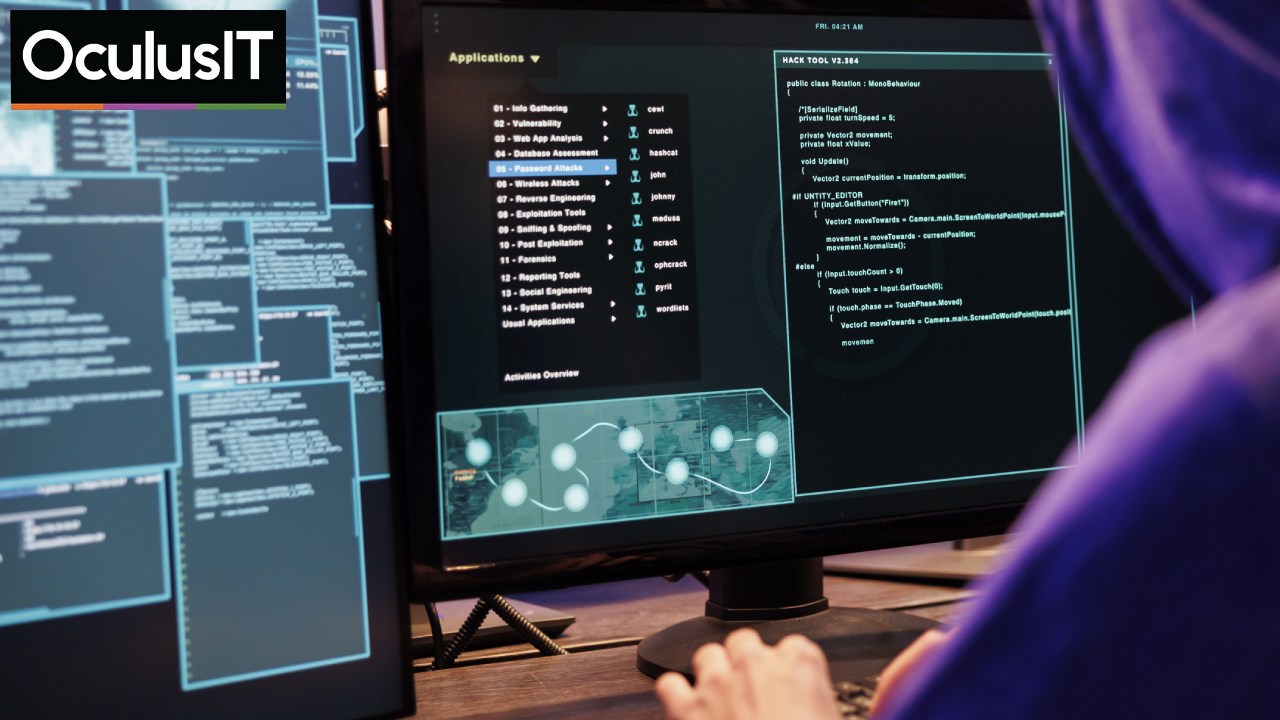
Empowering Students: Cybersecurity Awareness Initiatives for Campus Life
October 14th, 2024
October is Cybersecurity Awareness Month, highlighting the critical importance of cybersecurity in educational institutions. As students increasingly rely on technology, protecting sensitive data becomes paramount. Institutions face the challenge of safeguarding their communities while educating them about potential cyber threats.
As a Managed Security Services provider focused on higher education, OculusIT recognizes the need for tailored cybersecurity awareness initiatives. By cultivating a culture of cybersecurity on campus, institutions can empower students to actively protect both personal and institutional data.
In this blog, we’ll explore practical strategies to create a cyber-conscious community that equips students to navigate today’s digital landscape safely.
Understanding the Student Landscape
Today’s students navigate a digital landscape filled with social media, online learning platforms, and various applications. Unfortunately, this connectivity makes them prime targets for cybercriminals.
Cyber attacks on education institutions globally have resulted in over $53 billion in downtime costs from 2018 to mid-September 2023, breaching more than 6.7 million personal records across 561 incidents.
In the U.S. alone, 386 ransomware incidents accounted for an estimated $35.1 billion of these costs, highlighting the significant financial impact of these cyber threats on educational systems.
This alarming statistic highlights the urgent need for educational institutions to implement effective cybersecurity education programs that resonate with this demographic.
Creating Engaging Cybersecurity Programs
To effectively engage students in cybersecurity awareness, institutions can implement a variety of interactive programs:
Interactive Workshops
Organizing hands-on workshops is an excellent way to educate students about cybersecurity threats. These sessions can cover essential topics such as recognizing phishing attempts, creating strong passwords, and understanding safe browsing practices.
By providing real-life scenarios and practical exercises, students can learn how to identify and respond to potential threats effectively.
Gamification
Incorporating gamified elements into cybersecurity training can make learning more engaging. Institutions can develop quizzes or competitions that reward students for completing training modules or successfully identifying security threats.
This approach not only fosters a sense of community but also encourages friendly competition among peers, making learning about cybersecurity fun and interactive.
Peer-to-Peer Learning
One of the most effective ways to promote cybersecurity awareness is through peer-to-peer learning. Educational institutions can encourage students to become “Cybersecurity Ambassadors.” These ambassadors can lead discussions, share their knowledge with classmates, and organize events focused on cybersecurity topics.
By empowering students to take on leadership roles, institutions can create a network of informed individuals who actively promote safe online practices.
Success Stories
Sharing success stories from students who have effectively identified and reported phishing attempts or other security issues can inspire others to be vigilant. Highlighting these experiences not only reinforces the importance of cybersecurity but also showcases the impact that informed individuals can have on campus safety.
Utilizing Technology for Awareness
Technology can be a powerful ally in promoting cybersecurity awareness among students. Educational institutions should leverage social media platforms to share daily cybersecurity tips and best practices.
Hosting live Q&A sessions with IT professionals on platforms like Instagram or Facebook can provide students with direct access to expert advice.
Additionally, creating engaging video content that addresses common cybersecurity myths and misconceptions can help demystify the topic. Short videos explaining complex concepts in simple terms resonate with students and encourage them to adopt safer online behaviors.
Collaborating with Managed Security Services Providers
Partnering with experts like OculusIT can enhance these initiatives significantly. As a dedicated Managed Security Services provider for higher education, OculusIT offers tailored solutions that help institutions bolster their cybersecurity posture while focusing on core academic missions.
By implementing comprehensive security measures, institutions can create safer environments for learning and collaboration.
Feedback and Continuous Improvement
To ensure that cybersecurity initiatives remain relevant and effective, institutions should implement feedback mechanisms such as surveys or focus groups. Understanding student perceptions of cybersecurity will help identify areas for improvement and adapt programs accordingly.
Building a Cyber-Conscious Community
Fostering a culture of cybersecurity awareness is not just an institutional responsibility; it requires participation from all members of the campus community.
By implementing engaging programs, leveraging technology, and encouraging peer-to-peer learning, educational institutions can empower students to take an active role in their own cybersecurity education.
As we navigate an increasingly digital world, equipping students with the knowledge and skills necessary to protect themselves online will not only safeguard sensitive data but also build trust among students, faculty, and stakeholders alike.
With support from OculusIT a leading Managed Security Services provider, you can create a cyber-conscious community that prioritizes safety in our interconnected lives.
Recent Articles

Cybersecurity Awareness Month: Fortifying Your Defenses in Higher Education
October 07th, 2024

Securing Academia: The Role and Benefits of the CISO in Higher Education
September 30th, 2024

Transforming Higher Education Through Managed Infrastructure Services
September 23rd, 2024






















